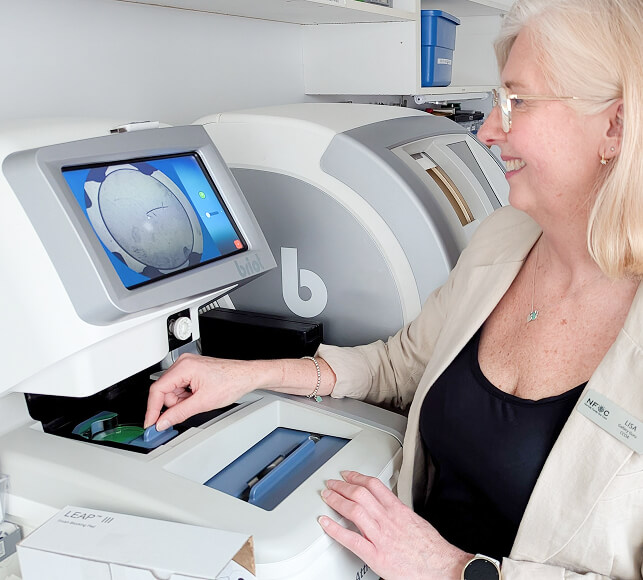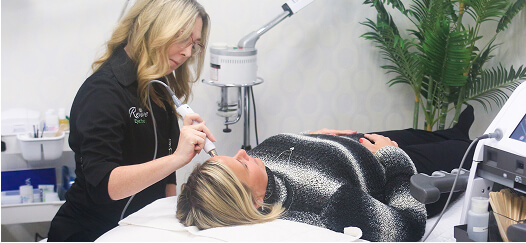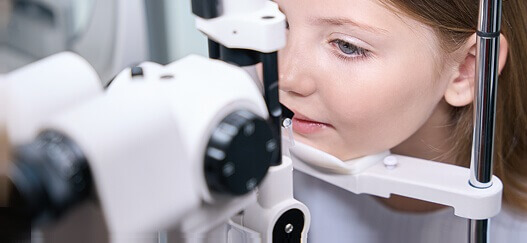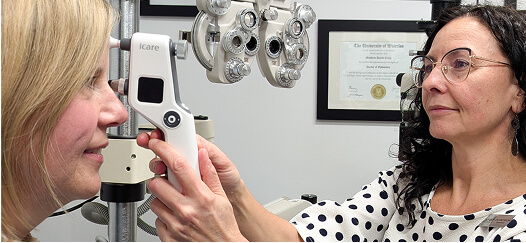At Norfolk Family Eye Care, we know how vital
vision is to daily life.
Regular eye exams play a crucial role in maintaining optimal eye health, not only for detecting potential sight problems but also for identifying signs of other health conditions that may affect your eyes.
Our practice is equipped with the latest technology, ensuring you receive the most comprehensive and accurate eye examinations available.

Standard eye exam: what’s included
A standard eye exam covers a thorough assessment of your sight and eye health. Here’s what you can expect during your visit:
Visual acuity testing: This test measures the sharpness or clarity of your vision. Using an eye chart, we assess how well you can see at different distances, which helps determine if corrective lenses are needed.
Binocular vision testing: This test evaluates how well your eyes work together. Good binocular vision is important for depth perception and proper eye coordination.
Refraction: During this test, we determine your prescription for glasses or contact lenses. By using a special instrument to change lens power, we identify which lenses provide the clearest vision.
Comprehensive ocular health assessment using OCT imaging: Optical coherence tomography (OCT) is a non-invasive scan that captures detailed images of the retina, the light-sensitive tissue at the back of the eye, to detect eye conditions early.
The eye examination also includes a full anterior and internal health evaluation, including a comprehensive dilated eye examination.
Specialized tests are available too
In addition to the standard tests, we offer a range of specialized diagnostic tools to further assess your eye health:
OCT Imaging: As mentioned, OCT provides high-resolution images of the eye’s internal structures, helping us catch eye diseases in their earliest stages.
Visual field testing: This test measures your peripheral (side) vision, helping detect sight loss that might occur with conditions like glaucoma or neurological disorders.
Topography: Corneal topography maps the cornea – the clear, dome-shaped front of the eye that focuses light. This test is particularly useful for patients considering contact lenses, as it helps determine the most suitable lenses for your eye shape.
Biometry/myopia management: Biometry involves measuring the eye's length and shape to assist with the fitting of intraocular lenses for cataract surgery, while myopia management helps slow the progression of nearsightedness, especially in children.
Meibography and tear testing: These tests assess the health of your tear glands and the quality of your tears. They’re particularly important for diagnosing dry eye syndrome, which can cause discomfort and vision issues.


How often should I get an eye exam?
The frequency of your eye exam depends on your age and overall eye health. For seniors, we recommend an eye assessment every 12 to 18 months to monitor for age-related changes and conditions such as cataracts or macular degeneration.
Healthy adults without significant eye conditions should have an eye exam every two years to maintain good eye health. Children should have an annual eye test to ensure proper visual development, as sight issues can impact their learning and overall well-being.
A full eye exam typically takes on average 30 minutes, depending on the complexity of the examination and any additional tests that may be required.
Schedule your eye exam today
We’re committed to providing the highest standard of care to ensure your eye health remains at its best. Schedule your eye exam today and take a step towards better vision and overall well-being.









